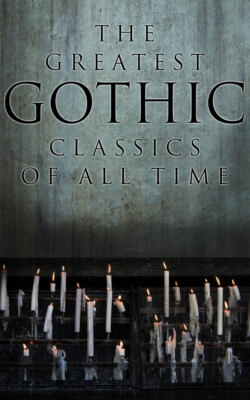Читать книгу The Greatest Gothic Classics of All Time - Эдгар Аллан По - Страница 8
На сайте Литреса книга снята с продажи.
SONNET
TO THE RIGHT HONOURABLE
LADY MARY COKE
ОглавлениеThe gentle maid, whose hapless tale
These melancholy pages speak
Say, gracious lady, shall she fail
To draw the tear adown thy cheek?
No; never was thy pitying breast
Insensible to human woes;
Tender, though firm, it melts distrest
For weaknesses it never knows.
Oh! guard the marvels I relate
Of fell ambition scourg’d by fate,
From reason’s peevish blame.
Blest with thy smile, my dauntless sail
I dare expand to fancy’s gale.
For sure thy smiles are fame.
H. W.
1. The following remark is foreign to the present question, yet excusable in an Englishman, who is willing to think that the severe criticisms of so masterly a writer as Voltaire on our immortal countryman, may have been the effusions of wit and precipitation, rather than the result of judgment and attention. May not the critic's skill, in the force and powers of our language, have been as incorrect and incompetent as his knowledge of our history? of the latter, his own pen has dropped glaring evidence. In his preface to Thomas Corneille's Earl of Essex, Monsieur de Voltaire allows that the truth of history has been grossly perverted in that piece. In excuse he pleads, that when Corneille wrote, the noblesse of France were much unread in English story; but now, says the commentator, that they study it, such misrepresentations would not be suffered—yet forgetting that the period of ignorance is lapsed, and that it is not very necessary to instruct the knowing, he undertakes, from the overflowing of his own reading, to give the nobility of his own country a detail of Queen Elizabeth's favourites—of whom, says he, Robert Dudley was the first, and the Earl of Leicester the second. Could one have believed that it would be necessary to inform Monsieur de Voltaire himself, that Robert Dudley and the Earl of Leicester were the same person? "One sees there a mixture of the grave and the light, of the comic and the tragic; often even a single adventure exhibits all these contrasts. Nothing is more common than a house in which the father scolds, a girl occupied by her passions weeps, the son ridicules both, some relations take a differing part in the scene, etc. We do not infer from this that every comedy ought to have scenes of buffoonery and of gravity. Now there is gaiety, now seriousness, now a mixture. Then there are others in which tenderness moves one to tears. We must not exclude any type, and if I were asked which is the best I would answer, 'the one which is best made.'"
2. "One sees there a mixture of the grave and the light, of the comic and the tragic; often even a single adventure exhibits all these contrasts. Nothing is more common than a house in which the father scolds, a girl occupied by her passions weeps, the son ridicules both, some relations take a differing part in the scene, etc. We do not infer from this that every comedy ought to have scenes of buffoonery and of gravity. Now there is gaiety, now seriousness, now a mixture. Then there are others in which tenderness moves one to tears. We must not exclude any type, and if I were asked which is the best I would answer, 'the one which is best made.'"
3. "All of these characteristics are naive. Everything is convenient to those who introduce the scene and to the customs that you give them. These natural familiarities would, I think, have been well received in Athens, but Paris and our nation prefer another type of subtlety.
